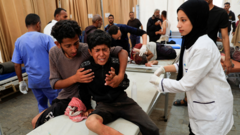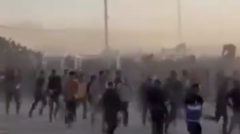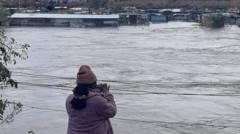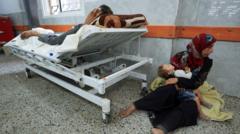Fighting continues in Myanmar, undermining ceasefire efforts aimed at facilitating earthquake relief, while humanitarian needs escalate following the disaster that claimed over 3,500 lives.
Myanmar's Chaos: Ongoing Conflict Thwarts Earthquake Relief Efforts
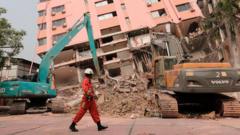
Myanmar's Chaos: Ongoing Conflict Thwarts Earthquake Relief Efforts
Despite declared ceasefires, violence persists in Myanmar as humanitarian needs soar post-earthquake.
Fighting persists in Myanmar even after the military junta and a coalition of rebel groups announced temporary ceasefires designed to assist earthquake relief efforts. Reports from the UN Human Rights office indicate that the military has conducted at least 14 attacks following the ceasefire declarations. The military has accused two of the rebel groups involved in the ceasefire alliance of launching assaults, while one of the rebel groups countered that its actions were in direct response to military offensives.
The spokesperson for the military council, Maj Gen Zaw Min Tun, stated that the military would retaliate if any of its bases were attacked without provocation. Meanwhile, UN High Commissioner for Human Rights Volker Türk has called for an immediate halt to all military operations in order to facilitate aid for those affected by the devastating 7.7 magnitude earthquake that struck on March 28.
The civil war in Myanmar, sparked by a military coup in 2021, has created a volatile environment across the country, severely complicating relief efforts. Following the quake, the military council announced a 20-day ceasefire on April 2, coinciding with the ceasefire declaration by the rebel alliance composed of three different groups. As of Monday, official reports tallied the earthquake death toll at 3,564, with an additional 5,012 injured and 210 people still unaccounted for.
In Mandalay, one of the most severely affected cities, rescue teams are still recovering bodies from the ruins of collapsed structures. Recent rainfall has posed additional challenges for humanitarian efforts. The UN human rights office has noted that while there has been progress in relief operations where access has been granted, longstanding military restrictions continue to obstruct aid delivery to many areas in dire need, leaving local residents to manage small-scale relief efforts on their own.
UN humanitarian chief Tom Fletcher highlighted the dire living conditions in Mandalay, calling attention to the urgent needs for food, water, power restoration, and shelter. Compounding the crisis are ongoing aftershocks, including a recent 4.9 magnitude quake that has left residents grappling with trauma. Fletcher remarked that prior to the earthquake, around 20 million people in Myanmar were already in need of assistance, indicating an urgent and growing humanitarian crisis fueled by the combined effects of conflict and natural disasters.



